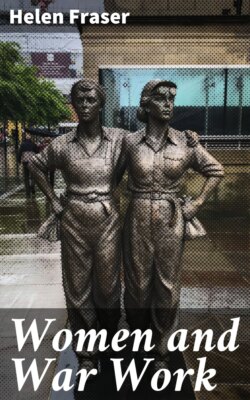Читать книгу Women and War Work - Helen Fraser - Страница 4
FOREWORD
Оглавление"Our War Loan from England"—That is the heading under which were grouped the nine lectures given by Miss Helen Fraser at Vassar College. England has borrowed a billion or so of dollars from us, but the obligation is not all her way. The moral strength of our cause is immeasurably increased by her alliance, and the spectacle of a great democracy organizing itself for complete unity in a world crisis is worth an incalculable amount to us. Such a vision Miss Fraser has brought to her wider public among the women of America in this notable book. Of her personal influence let me quote again from the Vassar students' newspaper:
"Miss Fraser, here's to you! We don't need to say that we liked Miss Fraser and everything she had to tell us. The way we followed her around, and packed every room in which she spoke, out to the doors and sometimes up to the ceiling, is proof enough of that. And even the fact that it was Sunday could not check our outburst of song in the Soap Palace as Miss Fraser departed. Her gracious speech of appreciation left with us the question not phrased by her before, but certainly in the minds of every one of us who had been hearing her: 'What are we going to do?'"
An unsolicited testimonial, this, of the most genuine kind. The College students of today are not easily coaxed into lecture rooms outside of their own classes.
I believe that Miss Fraser's book will be read with the same eager attention that followed her first speeches in this country as she began her work of educating American women to a sense of what the mobilization of the entire citizen army of a democracy must mean.
Nor will her influence cease there. Miss Fraser's book is a piece of history; and history is action. The wonderful work of the women of England is already emulated by the splendid efforts along many lines of the women in our country. The new lessons of co-operation and of selfless devotion, learned from this book will, I confidently predict, within a few months, be translated into action by the Women's War Service Committees in every state of our land.
And the greatest lesson of all is that women and men must work together in this new world. I count it an honour—being a man—to be asked to introduce Miss Fraser in this way to the American public. For my part I would have no separate women's division, except such as concerns the tasks exclusively for women. I would have women side by side with men in every division of labour, working out the task with equal fidelity, equal authority, and equal rewards. One of the results of this amazing age is going to be the new comprehension, understanding, and sympathy of the one sex for the other.
H.N. MacCRACKEN.
Vassar College,
Poughkeepsie, New York.
January 11, 1918.
The women of all the allies are one in this great struggle. Our hopes and our fears, our anxieties and our prayers, our visions and our desolations, are the same.
Our work is the same task of supporting and sustaining the energies of our men in arms and of our nations at home. All the allied women know more of each other than they ever did before, and this is all to the good.
The task of women in this struggle and in the reconstruction to come after, are great tasks, and the world needs in every country not only the wisdom and knowledge of its own women but the strength in them that comes from being one of a great world-wide group and conscious of the unity of all women.
Anything that can help to that unity and understanding seems to me of great value, and this record is written for American women in the hope it may be of some small service.
H.F.
December 25, 1917.
